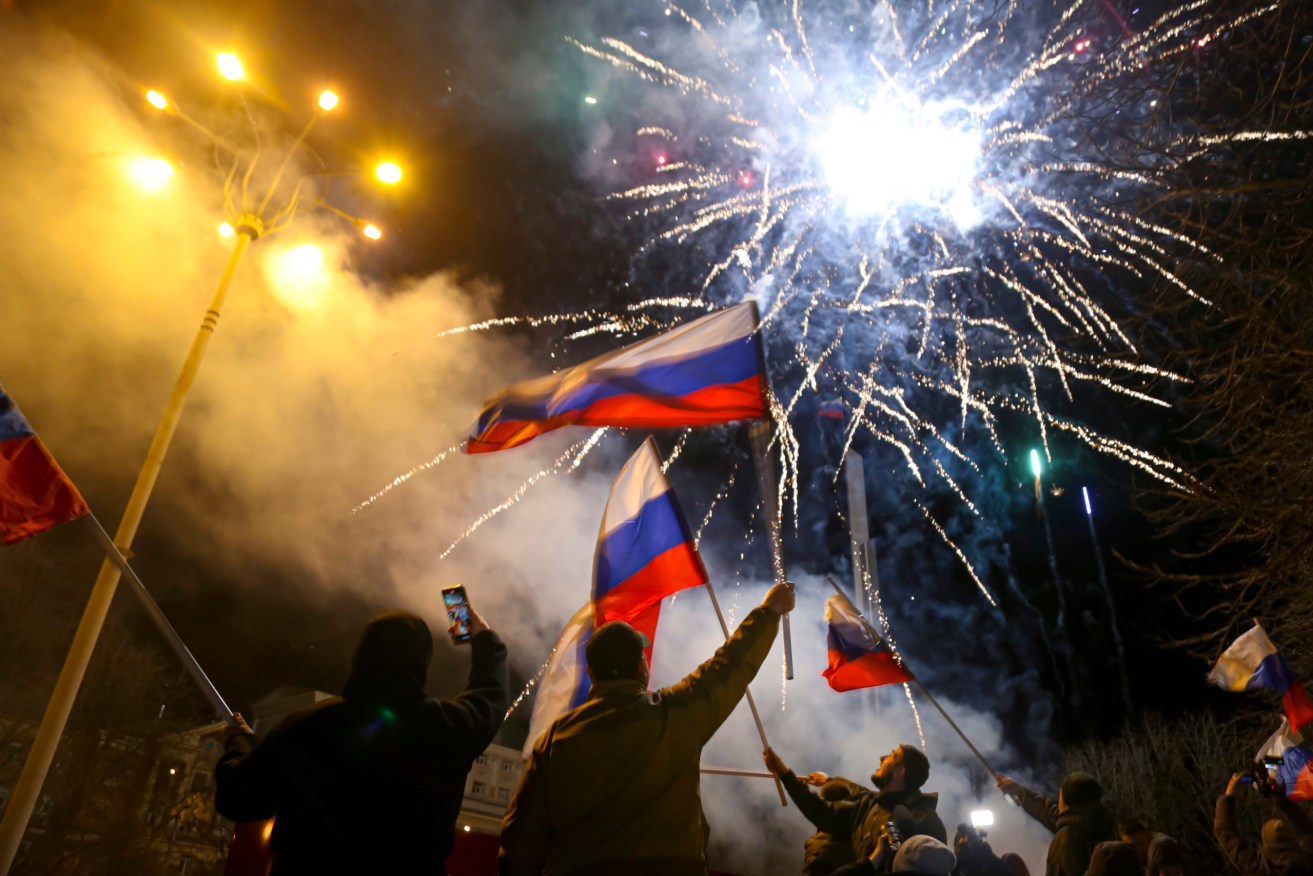Russia sends ‘peacekeepers’ into Ukraine separatist regions
Russian President Vladimir Putin has recognised two breakaway regions in eastern Ukraine as independent and ordered the Russian army to launch a peacekeeping operation in the area, with Prime Minister Scott Morrison saying Australia would impose economic sanctions if there was any further military action.

Russian flags are waved inside Donetsk, one of two Ukraine separatist territories recognised as independent by Russian president Vladimir Putin on Monday Photo: AP/Alexei Alexandrov
Putin on Monday told Russia’s defence ministry to deploy troops into the two breakaway regions to “keep the peace” in a decree issued shortly after he announced recognition for Russia-backed separatists there, drawing US and European vows of new sanctions.
It was not immediately clear the size of the force that Putin was dispatching, when they would cross the border into Ukraine and exactly what their mission would be.
In a lengthy televised address on Monday, Putin – looking visibly angry – described Ukraine as an integral part of Russia’s history and said eastern Ukraine was ancient Russian lands and that he was confident the Russian people would support his decision. .
Russian state television showed Putin, joined by Russia-backed separatist leaders, signing a decree recognising the independence of the two Ukrainian breakaway regions along with agreements on cooperation and friendship.
Defying Western warnings against such a move, Putin had announced his decision in phone calls to the leaders of Germany and France earlier, both of whom voiced disappointment, the Kremlin said.
Moscow’s action may well torpedo a last-minute bid for a summit with US President Joe Biden to prevent Russia from invading Ukraine. The rouble extended its losses as Putin spoke, at one point sliding beyond 80 per dollar.
Biden will issue an executive order soon prohibiting “new investment, trade, and financing by US persons to, from, or in” the two breakaway regions, the White House said.
The European Union “will react with sanctions against those involved in this illegal act,” President of the European Commission Ursula von der Leyen and European Council President Charles Michel said in a joint statement.
British foreign minister Liz Truss said in a Twitter post that on Tuesday the government will announce new sanctions on Russia in response to Putin’s decision.
NATO Secretary-General Jens Stoltenberg accused Russia of continuing to fuel the conflict in eastern Ukraine and “trying to stage a pretext” for a further invasion. Russia annexed Crimea from Ukraine in 2014.
In his address, Putin delved into history as far back as the Ottoman empire and as recent as the tensions over NATO’s eastward expansion – a major irritant for Moscow in the present crisis.
With his decision, Putin brushed off Western warnings that such a step would be illegal, would kill off peace negotiations and would trigger sanctions against Moscow.
“I deem it necessary to make a decision that should have been made a long time ago – to immediately recognise the independence and sovereignty of the Donetsk People’s Republic and the Luhansk People’s Republic,” Putin said.
He said earlier that “if Ukraine was to join NATO it would serve as a direct threat to the security of Russia.”
Putin has for years worked to restore Russia’s influence over nations that emerged after the collapse of the Soviet Union, with Ukraine holding an important place in his ambitions.
Russia denies any plan to attack its neighbour, but it has threatened unspecified “military-technical” action unless it receives sweeping security guarantees, including a promise that Ukraine will never join NATO.
Recognition of the rebel-held areas could pave the way for Moscow to send military forces into the two separatist regions – Donetsk and Luhansk – openly and argue that it is intervening as an ally to protect them against Ukraine.
Despite swift sanctions threats, it was not immediately clear how closely Western governments would coordinate their actions. Earlier this week, US and European officials said the United States and allies were not totally in agreement about how to respond in case of stepped-up support for pro-Russian separatists.
Putin’s move will also narrow the diplomatic options to avoid war, since it is an explicit rejection of a seven-year-old ceasefire mediated by France and Germany, touted as the framework for future negotiations on the wider crisis.
Separately, Moscow said Ukrainian military saboteurs had tried to enter Russian territory in armed vehicles leading to five deaths, an accusation dismissed as “fake news” by Kyiv.
Both developments fit a pattern repeatedly predicted by Western governments, who accuse Russia of preparing to fabricate a pretext to invade by blaming Kyiv for attacks and relying on pleas for help from separatist proxies.
Washington says Russia has massed a force numbering 169,000-190,000 troops in the region, including the rebels in the breakaway regions, and could invade within days.
Australian Prime Minister Scott Morrison said he hoped diplomacy would prevail despite the Russian move.
“Some suggestions that they are peacekeeping is nonsense. They have moved in on Ukrainian sovereign territory,” he told reporters in Tasmania.
“We cannot have threats of violence being used to seek to advantage a nation’s position over others.”
Morrison said Australia would be in lockstep with other nations and immediately impose economic sanctions on Russia should there be further military action in Ukraine.
“Russia should step back, it should unconditionally withdraw, back behind its own borders and stop threatening its neighbours,” he said.
“It’s unacceptable, it’s unprovoked, it’s unwarranted, and Russia should understand that by seeking to invade another country, that this cannot advantage them, and it would seriously and significantly cost Russia.”
The call for Russia to withdraw has been reiterated by Opposition Leader Anthony Albanese.
“There is no place in 2022 for nation states to just try to carve off sections of another sovereign nation state, which is what we’re seeing here,” he told reporters.
“This unilateral statement by Vladimir Putin has no place in a world in which we have respect.”
-AAP




